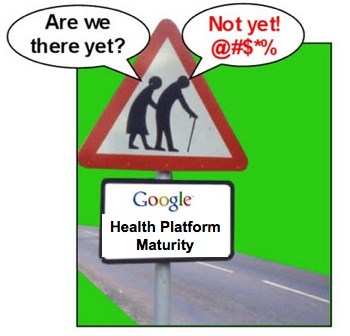
As Scott points out, it is not as if the Google Health team does not have a lot of good people working for them. All who I have met have a passion for what they do. No, the problem is not with them, it sits higher-up in the corner office where senior Google execs have yet to dedicate the resources to truly make the Google Health platform a viable alternative to HealthVault. Yes, Google has made a some announcements, most recently with regards to Advance Directives, over the last several months that demonstrate that the team continues to build functionality into the platform, but none of this functionality is new, none of it novel, none of it that goes beyond what HealthVault had at least a year or more prior. (Note, the Advance Directives feature is pretty significant as it signals a change to the core data model of Google Health allowing it to store unstructured data – something that Google Health did not support previously. This does open numerous opportunities for expansion of services within this platform.)
And don’t even get us started on Google Health’s abysmal efforts in attracting new partners to the platform to create a truly viable ecosystem…
The sad thing is that innovation is driven as much by competition as it is by shear creative inspiration. Without a viable competitor, HealthVault may become complacent and we, the consumer of such services will ultimately pay the price. Please Google, for the sake of all, at least quintuple the size of Google Health’s team so that it is at least a tenth the size of HealthVault’s. Maybe then we will begin to see some sign of a viable competitor, a viable platform and a viable choice for the consumer and Google Health will once again become relevant to the market.




I agree – it is just bizarre that they are so silent, given the opportunity and the timeliness.
It seems Google’s strategy has always been to throw good technology into the market and let the market build it up into a brand.
But as we all know IT and health care are not partners that naturally attract… the relationship needs to be actively facilitated to create something of value, yet Google appears to have moved on.
I find it difficult to believe that Google would abandon Google Heath, given that the healthcare industry is one place where money will be flowing over the next few years. That said, as a veteran of the tech industry and a long time observer, it is more likely that Microsoft simply “gets it” more than Google does at this point in time.
What does that mean? Microsoft figured out a couple of decades ago that the enterprise market was a completely different space than the consumer market. Google was, and is, mostly a consumer driven company. They don’t have the sales and professional services presence and experience (either via troops on the ground or through partners) to effectively compete.
Building the necessary ecosystem is a much bigger challenge, both in terms of time and money, than simply improving their current product offering. Without the ecosystem Google will not be able to effectively establish the relationships with big name customers to win deals large enough for a decent ROI.
I suspect that their “waffling” has more to do with deciding on a strategy, including a road map for the “rollout,” to effectively compete in the enterprise than it does with throwing more resources at the product–without the ecosystem the product will continue to be irrelevant.
In short, deciding how to attack is a non-trivial decision for Google. That said, I don’t believe they will remain on the sidelines. NO WAY.
“Building the necessary ecosystem is a much bigger challenge, both in terms of time and money, than simply improving their current product offering. Without the ecosystem Google will not be able to effectively establish the relationships with big name customers to win deals large enough for a decent ROI.”
@Carlos Levya – agree with you on this point. However, Google’s consumer focus on “simple” products with rapid, large scale adoption just does not sync with the more complex healthcare ecosystem considerations. If they had really focussed on a few enterprise solutons, they could have put up a few billion to get in the game – something MSFT has done in a slow, staged manner over the past few years.
Having observed/read the thinking of Google Founders over the years – nothing shy of total domination (by distruption) is a product worth pursuing.
Google Health on its own cannot deliver on such ambitions. It needs more of a “suite of offerrings” in the way it has been demonstrated by Microsoft Health Solutions Group. Even with the coming consolidation, it will not be a mkt oppty in the lines of the “total domination” way of thinking at Google HQ.
John, you have been one of the few who pointed out these shortcomings a while ago (not fashionable) – but good to see veterens like Scott Shreve put forth “unvarnished observations” on the product called Google Health.
I for one have never thought of Google Health as a platform in a way that befits the healthcare ecosystem – we have of course exchanged those views in the past.
In a lot ways – Google Health died of SIDS while in the cradle back in Sept 2007 – right before Adam Bosworth left the building!
I could be very wrong here – but if the history of Google products is any indication of their way of entering markets – I have put up a sane bet with my observations – and only a Lazarus Man episode can bring back Google Health!!
There is plenty of competition out there, but none with the clout that MS and Google carry. At last count there were >75 PHR vendors. Until there is a viable business model that Google can capitalize on, I do not see much innovation in this space on Googles end. Their revenue is still coming from search at this point. They need to go beyond Adsense/Adwords and hunt down some partners that can help them grow all facets of their technology.
From the NYT –
And You Thought a Prescription Was Private
By MILT FREUDENHEIM
Published: August 8, 2009
http://www.nytimes.com/2009/08/09/business/09privacy.html?pagewanted=1&_r=1&sq=google%20health&st=Search&adxnnl=1&scp=1&adxnnlx=1249841125-6F4shdizyNmeas0oLwlhig
“Microsoft and WebMD acknowledge that the privacy rules in the stimulus law apply to them. Google says the law’s prohibitions do not apply to it, except for its duty to report any breaches of medical privacy. “Google is bound by the privacy policy that people agree to when they sign up,” said Christine Chen, a Google spokeswoman.”
As for MSFT – its not NYT saying it – here is Sean Nolan Chief Architect of Microsoft Health Solutions in his own words….
You put your right HIPAA in…Wednesday, June 03, 2009 6:00 AM
http://blogs.msdn.com/familyhealthguy/archive/2009/06/03/you-put-your-right-hipaa-in.aspx
“We are now prepared to sign a Business Associate Agreement with any covered entity that feels it is an important part of their responsibility under the HIPAA legislation. We have worked hard to create the text of that BAA, and are committed to being open and transparent about exactly what it contains. In fact, it is posted online for anybody to review here.”
Dr. Vince Kuraitis (and others) have postulated that Google Health must stay in the game – I won’t try to take it apart piece by piece – let just pick one – an important one……
http://e-caremanagement.com/microsoft-healthvault-is-a-serious-business-strategy-will-google-health-become-more-than-hobby/
“I understand that many will see this capability as “Big Brother Google” and others as “Dr. Google”. Let’s save these discussions for another day.
Patients want personalized health information, and the Google Health database is a repository of patient information. The marriage of search capabilities and health care is a great fit.”
Dr. Kuraitis:
Sorry Sir – have to disagree with your preface on Big Brother Google, Dr. Google (or Dr. Evil)….. Let’s take their approach for starters…. “Google is bound by the privacy policy that people agree to when they sign up” – Christine Chen, a Google spokeswoman.
With this kind of approach by Google – is it any surprise they can’t deliver on the promise of Google Health, or build an ecosystem around Google Health? I would suggest Google Health never wanted in the game by the same rules of engagement as the rest of the healthcare ecosystem.
It just cannot be “discussions for another day” as you have prefaced – it MUST all go together.
I welcome a discussion on your other points – the veracity, of which I would suggest, obscures its irrelevance in the context of why Google Health will not deliver on the expectations set by the market.
John’s post is right on the money.
I’m a big fan of Google. I love their innovations and how they incrementally come up with improvements to their applications, such as gmail, calendar, documents, etc. However, I don’t see the same pace of innovation with Google Health (GH), which I use. In fact, I once posted a message in their help section to find out if Google is still committed to GH.
Google’s users will grow suspicious if progress is lethargic. They’ll sense that GH may just be an experiment that will soon be abandoned–especially given the current economic climate. If users suspect that GH won’t stick around, then they won’t bother to add their records. If that happens, then GH will atrophy.
It also doesn’t help that Google is mostly silent about GH. There are few announcements/press releases. Whoever monitors the help section of GH is not terribly keen on answering questions/concerns. So what are we, the users, supposed to think?
Lastly, Google has my e-mail address and they know that I’m a GH users. Why don’t they send me e-mail with any new developments? I mostly come across those by accident. That’s how I came across “Fall update on Google Health”